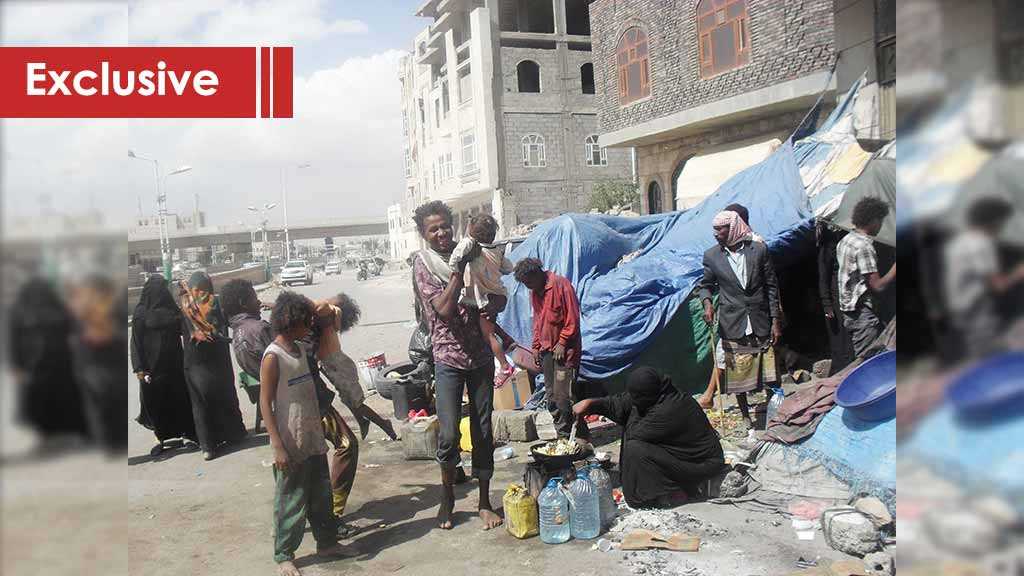
The Plight of the Internally Displaced Yemenis in Sanaa

By Al-Ahed Correspondent
Sana’a - On the sidewalk of Al Sayila' road near Al Hassabah area to the east of the capital Sana'a, Ahmed Al Zabidi is standing near his wife who is baking in mud oven using plastic bottles and cartoons he gathered in the morning. His four-year-old girl Rwan, was waiting for bread ahead of lunch time.
On its mission to cover the sufferings of Hudaydah’s besieged Duraihimi civilians, al-Ahed couldn't find easily families from this district, as it seems they couldn't flee conflict and still languish under US backed Saudi-led militants siege. In Sana'a, al-Ahed met only families fled from Hudaydah city's outskirts areas who struggle to survive on their own, mostly in small ships and tents far away from displaced camp on the outskirts of Sana'a city.
Among the 996,600 people displaced from Hudaydah, which the UN Office for the Co-ordination of Humanitarian Affairs (OCHA) said in a January 15th report, al-Ahed met Ahmed Al Zabidi who lives with his family and others in small shops at Hishishiah neighborhood of Al Hassabah area in Sana'a city.

Al Zabidi, 35, is a father of two children – Haneen, two, and Rawan, four. He said he left his house on the outskirts of Hudaydah city last August, following the kick-off of the Saudi assault on the city and has been living in this small shop in Sana'a since then.
The small shop, is used as a room and has a bathroom in the corner. On Monday's afternoon, al-Ahed reporter visited the neighborhood at around 2:00 p.m..
"I pay 20, 000 YR ($40) as a rent for the shop," Al Zabidi noted, saying he was living in his own house at Zayd St. in Hudaydah city, about 15km from the besieged district of Al Duraihimi.

"I make a living by collecting plastic bottles and sell them," Al Zabidi said while his wife cooking using bottles and cartoons he collected in the morning. He stressed that he receives aids from organizations and some of the do-gooders do visit them and help them.
Nearby shops were crowded with displaced people from extended families, who live together in shops and erected tents near the gates of the shops to decrease the crowd inside the shops.
The families are happy they left Hudaydah, despite the difficult living-conditions they live in in Sana'a far away from their homes and farms. However, it seems that Al Duraihimi residents still besieged in miserable conditions, especially we could not speak to residents on phone due to the interruption of communication networks there.
Imminent Humanitarian Catastrophe
Early this week, officials in Sana'a have launched a campaign on social media calling for the immediate lifting of the siege on the district.
Either senior officials of the Al Duraihimi district, nor the acting governor of Hudaydah, Mohammed Quhaim, met their promises to answer questions of al-Ahed when agreed during telephone calls to answer them after inquiring they should be sent through WhatsApp and will be replied there.
Furthermore, on Sunday, Ministry of Health and Population, in a statement obtained by al-Ahed, warned of an imminent humanitarian catastrophe at Al Duraihimi district, calling on UN humanitarian groups to intervene immediately to lift the 5-month-long siege.
"The US/ UK backed Saudi-led coalition imposes a suffocating siege of Al Duraihimi district on land, sea and in the air, refusing the entering of humanitarian or healthy assistances," the statement read.
Mohammed Ali Al Houthi, head of Supreme Revolutionary Committee, has called on all journalists, writers and media to adopt a campaign through which they can support the besieged civilians at Al Duraihimi district of Hudaydah.
"The role of international organizations is weak"
Hassan Al Weshali, an international law scholar and a lawyer based in Sana'a, denounced the siege on Al Duraihimi district, saying the military siege is unacceptable, and can only be considered following a decision of the UN Security Council.
Furthermore, in regard to the economic embargo, Al Weshali said: "it should never be used on civilians, as were the artillery bombardment and embargo the civilians of Al Duraihimi district have been experiencing constitute crimes of genocide and crimes against humanity."
Al Weshali stressed that direct hits on civilians are war crimes which are prohibited under the Fourth Geneva Convention that make a special protection for civilians.
He elaborated crimes of genocide which can be represented in depriving civilians of the necessities of life, risking their lives, and denying their right to life, for which no derogation is permitted.
Asked about the role of the international organizations in regard to what's happening on Yemen in general and Hudaydah in particular, Al Weshli said: "The role of the International Organizations is weak because most of the organizations, led by the United Nations, have been subjected to blackmail by Saudi Arabia and the United States."
He confirmed that these organizations have abandoned the principles for which they were created and turned into an instrument that is used by the countries of aggression as they wish.
However, Al Weshali pointed out that local organizations must work to "document these crimes, send our grievances to the world, and prepare judicial files and document them before the national courts to protect the rights of the victims."
He hoped that these documentations should be taken in order that "the coming days will bring us all to trial all perpetrators under international law and local laws."
Obstacles in reaching to the besieged district
Majed Ezzan, the Executive Director of the National Authority for Management and Coordination of Humanitarian Affairs (NAMCHA), downplayed the UN humanitarian aid groups' intervention, saying it comes too late to the degree that their standards for emergency humanitarian response are widely lost.
"For example, the necessity for immediate life-saving interventions to rescue the displaced people within 72 hours comes too late. Months go on and the displaced people did not get any of their guaranteed rights," Ezzan told al-Ahed.
Ezzan alluded that there is no access to humanitarian aids to reach civilians at Al Duraihimi district, since the first days of the escalation in July.
"Humanitarian aids had not been sent from World Food Program except late in December, and in quantities that cover only 25% of the populations' needs".
Ezzan said his (NAMCHA) and other UN aid groups face many obstacles in reaching the besieged district "due to the ongoing indiscriminate shelling of the [Saudi-led military coalition] aggression on [villages of Al Duraihimi] district, organizations can't enter the besieged district."
Ezzan and on behalf of (NAMCHA) demanded the United Nations and the International Community to pressure on UN Security Council to take urgent decisions to stop the unjust war on the Yemeni people, lift the embargo against Yemen in general and Al Duraihimi district in particular in order to allow a speed provision of humanitarian services to the civilians.



